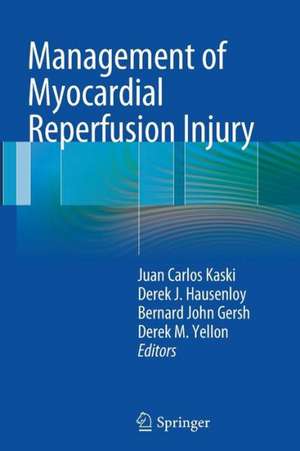Management of Myocardial Reperfusion Injury
Editat de Juan Carlos Kaski, Derek J. Hausenloy, Bernard John Gersh, Derek M. Yellonen Limba Engleză Paperback – 9 aug 2014
| Toate formatele și edițiile | Preț | Express |
|---|---|---|
| Paperback (1) | 780.29 lei 6-8 săpt. | |
| SPRINGER LONDON – 9 aug 2014 | 780.29 lei 6-8 săpt. | |
| Hardback (1) | 1108.51 lei 6-8 săpt. | |
| SPRINGER LONDON – 21 iul 2012 | 1108.51 lei 6-8 săpt. |
Preț: 780.29 lei
Preț vechi: 821.35 lei
-5% Nou
Puncte Express: 1170
Preț estimativ în valută:
149.30€ • 155.89$ • 123.57£
149.30€ • 155.89$ • 123.57£
Carte tipărită la comandă
Livrare economică 05-19 aprilie
Preluare comenzi: 021 569.72.76
Specificații
ISBN-13: 9781447158134
ISBN-10: 144715813X
Pagini: 324
Ilustrații: XVI, 308 p.
Dimensiuni: 155 x 235 x 17 mm
Greutate: 0.45 kg
Ediția:2012
Editura: SPRINGER LONDON
Colecția Springer
Locul publicării:London, United Kingdom
ISBN-10: 144715813X
Pagini: 324
Ilustrații: XVI, 308 p.
Dimensiuni: 155 x 235 x 17 mm
Greutate: 0.45 kg
Ediția:2012
Editura: SPRINGER LONDON
Colecția Springer
Locul publicării:London, United Kingdom
Public țintă
Professional/practitionerCuprins
Preface.- Introduction.- Myocardial reperfusion injury: The clinical importance and magnitude of the problem, JC Kaski and G Ambrosio.- Section I. Myocardial reperfusion injury - Pathophysiology and molecular mechanisms.- The "no-reflow phenomenon" leading to myocardial injury and dysfunction- Consequences of reperfusion injury: Pathophysiology and molecular basis, H M Piper.- The coronary microcirculation expert’s view, A Pries.- The pathologist’s view, R Virmani.- The interventionist’s view.- Commonly asked questions.- Pathophysiology and molecular mechanisms - Established facts and future research avenues – An integrated view, D Yellon.- Section II. Diagnosis.- The electrocardiogram.- Biomarkers.- Angiography.- Echocardiography.- MRI.- SPECT.- PET, P Camici.- Commonly asked questions.- An integrated view on diagnostic strategies – Identifying salvageable myocardium.- Diagnostic algorithms.- Section III. Management – Currently available tools and future perspectives.- An integrated view on management – What is effective and what is not.- Discrepancies between results of treatment in experimental models and patients. Management algorithms, B Gersh.- Catheter lab options, M Marzilli.- Myocardial protection – Metabolic issues, WC Stanley.- Myocardial protection – Preconditioning.- New pharmacological options.- Assessment of treatment efficacy.- Commonly asked questions.- Future perspectives, JC Kaski, D Yellon and B Gersch.
Textul de pe ultima copertă
Much has been written about myocardial reperfusion injury and the controversies surrounding its existence and clinical relevance in the past 20 to 30 years. Unfortunately, however, there is little published information that integrates research findings with the practical aspects of its management and this has hindered the analysis of the clinical impact of the condition and its management.
The pathophysiology and molecular mechanisms of myocardial reperfusion injury are complex, while individual diagnostic techniques have been proposed but without a proper assessment of the relative values of these methods. The management of this condition has also been problematic, as therapeutic strategies that demonstrate prevention of myocardial reperfusion injury in experimental models have not translated into beneficial treatment strategies for patients.
Management of Myocardial Reperfusion Injury brings together leading cardiovascular researchers and cardiologists to provide a comprehensive and critical review of the issues. Existing and novel therapeutic strategies for preventing myocardial reperfusion injury are discussed in depth, which will result in this being a vital reference for cardiologists and all healthcare professionals with an interest in the pathogenesis and management of myocardial damage. Cardiologists in training will find this monographic work to be an invaluable formative tool. This book will hopefully assist in further reducing the morbidity and mortality resulting from acute myocardial infarction.
The pathophysiology and molecular mechanisms of myocardial reperfusion injury are complex, while individual diagnostic techniques have been proposed but without a proper assessment of the relative values of these methods. The management of this condition has also been problematic, as therapeutic strategies that demonstrate prevention of myocardial reperfusion injury in experimental models have not translated into beneficial treatment strategies for patients.
Management of Myocardial Reperfusion Injury brings together leading cardiovascular researchers and cardiologists to provide a comprehensive and critical review of the issues. Existing and novel therapeutic strategies for preventing myocardial reperfusion injury are discussed in depth, which will result in this being a vital reference for cardiologists and all healthcare professionals with an interest in the pathogenesis and management of myocardial damage. Cardiologists in training will find this monographic work to be an invaluable formative tool. This book will hopefully assist in further reducing the morbidity and mortality resulting from acute myocardial infarction.
Caracteristici
Proposed editors are top scientists and clinicians in their field Suggested contributors are also recognised experts A publication deals with integral diagnostic strategies Book presented in a modern and systematic way






